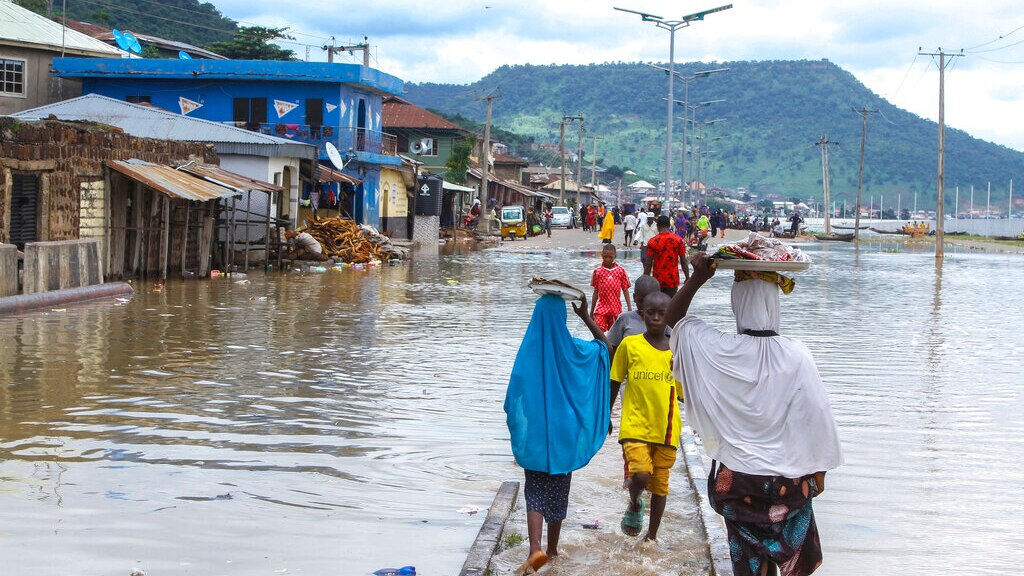ENVIRONMENT

FLOOD ALERT: NEMA DEPLOYS TEAMS ACROSS 15 HIGH-RISK STATES
The National Emergency Management Agency (NEMA) has deployed advocacy teams to 15 high-risk states in Nigeria to intensify flood awareness campaigns and encourage the relocation of residents in flood-prone areas. This proactive measure comes in the wake of the devastating flood in Mokwa, Niger State, which claimed over 160 lives and left hundreds missing.
Mokwa Flood Tragedy
NEMA’s Head of Press, Manzo Ezekiel, stated that residents of Mokwa were caught unprepared, despite prior warnings. Many victims reportedly lived in gully-prone locations vulnerable to heavy rain and runoff.
“Although Mokwa was identified as a flood-prone area, the magnitude was unprecedented,” Ezekiel said. “The houses were built in large gullies, which heightened the risk.”
The flood, which struck the commercial hub on May 23, followed forecasts by the Nigerian Meteorological Agency (NiMet) warning of heavy storms in Abuja and 14 other states, including Niger. The state, home to the Kainji, Jebba, and Shiroro dams, has seen repeated flooding, with this incident marking the sixth in 2025 alone. Earlier in April, dam water releases destroyed over 5,000 farms in 30 communities.
Nationwide Flood Risk Preparedness
To prevent further disaster, NEMA has launched community-based flood preparedness campaigns in the 15 high-risk states, including Kogi, Imo, Enugu, Adamawa, Taraba, Borno, Zamfara, Katsina, and the Federal Capital Territory (FCT).
Ezekiel stressed the importance of vigilance:
“Even LGAs not marked as high risk must remain alert. Every community must act to prevent what happened in Mokwa.”
NEMA’s campaign includes emergency healthcare training, evacuation planning, and distribution of first aid kits. According to Ezekiel, teams were sent directly into communities for face-to-face engagement due to poor awareness levels in many areas.
“Most residents didn’t understand the dangers until our teams visited,” he said. “We ensure state emergency services and local stakeholders are part of this effort.”
Government Response and Clarification
The Minister of Water Resources and Sanitation, Joseph Utsev, dismissed claims that dam water releases caused the Mokwa disaster. Speaking at a press conference in Abuja, he attributed the flood to:
- Heavy rainfall linked to climate change.
- Unregulated construction that blocked a tributary of River Dingi.
- Inadequate drainage systems in affected areas.
Utsev confirmed that the Kainji and Jebba dams are intact and safe and called for stricter adherence to flood warnings issued earlier in the 2025 Annual Flood Outlook (AFO). The AFO had projected flooding in 19 LGAs of Niger State, including Mokwa, and identified 1,249 communities in 176 LGAs across 33 states and the FCT as high flood-risk areas.
Casualty Update and Humanitarian Response
As of June 3, 2025, the Niger State Emergency Management Agency (NSEMA) confirmed that 160 bodies had been recovered. Some were buried under debris and retrieved with help from locals. Verification was done by NEMA, the International Organisation for Migration (IOM), and the Red Cross.
Meanwhile, the League of Northern Democrats (LND) has called for:
- Compensation for families of victims.
- Construction of subsidised housing for displaced persons.
- Relocation of vulnerable communities to higher ground.
- Investment in flood control infrastructure and early warning systems.
“We urge corporate bodies and wealthy individuals to support victims and fund rehabilitation,” LND said in a statement by its spokesman, Dr. Ladan Salihu.
Community Engagement in Ekiti State
In a related initiative, NEMA has intensified community engagement in Ekiti State, another area identified by NiMet as flood-prone. At a forum in Ikere Ekiti, NEMA’s Deputy Director of Disaster Risk Reduction, Dr. Evans Ugoh, urged residents to stop dumping refuse in drainage channels.
“Prevention includes risk assessment, early warning, public education, and capacity building,” Ugoh said.
SEMA General Manager, Oludare Asaolu, also warned that flooding could lead to long-term displacement, contamination of water sources, economic losses, and disruption of critical infrastructure.
The Ogoga of Ikere, Oba Adejumi Adu-Alagbado, praised the awareness efforts but called for stricter enforcement against environmental violations: “I urge local governments to prosecute those who dump waste in drainage systems.”
"This represents a significant development in our ongoing coverage of current events."— Editorial Board









